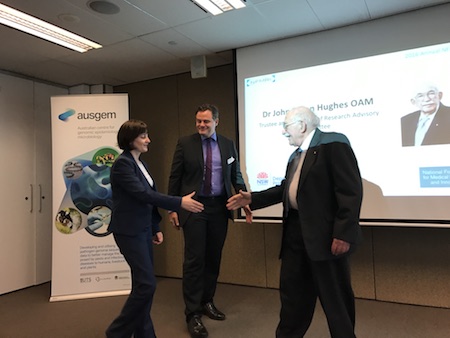8th december 2016
 [SYDNEY, NSW] –The National Foundation for Medical Research and Innovation (NFMRI) announced joint winners of the Dr John Dixon Hughes Medal for Medical Research Innovation and new 2017 grant recipients. In the presence of industry, business and research experts, successful researchers from across the country received funding to support the advancement of their innovations.
[SYDNEY, NSW] –The National Foundation for Medical Research and Innovation (NFMRI) announced joint winners of the Dr John Dixon Hughes Medal for Medical Research Innovation and new 2017 grant recipients. In the presence of industry, business and research experts, successful researchers from across the country received funding to support the advancement of their innovations.
The Medal, developed in honour of Dr John Dixon Hughes OAM (NFMRI’s longest standing Trustee) to showcase and celebrate the achievements of Australia’s recent biomedical research innovators, entails a $50,000 prize in the form of a research grant for each recipient and was awarded to both:
Prof. Mark Kendall from the University of Queensland, and
A/Prof Michelle McIntosh from Monash University.
Dr John Dixon Hughes OAM said “that the nominations were simply of exceptionally high calibre, demonstrating the sector’s progress and improvement of innovation commercialisation.” He noted that the Foundation’s research committee felt it was impossible to compare and decide between the final two finalists and hence made the decision to award two medals: one to Professor Mark Kendall, for his successes with the Vaxxas nanopatch vaccine delivery system; and one to A/Prof Michelle McIntosh for the development of an inhalable form of oxytocin to prevent postpartum haemorrhage in women from resource-poor settings.
NSW Department of Primary Industries, Director of Science and Research, Dr Jeffrey Hammond, also announced Prof. Eric Gowans, from the University of Adelaide, as the recipient of a new round of funding from a partnership between DPI and NFMRI to help develop and advance a vaccine for Zika virus.
“With 2016 proving to be a year of greatly increased numbers of mosquitos, which can transmit Zika virus, the successful project is well-placed to develop a novel vaccine to prevent infection and spread of this virus in New South Wales and beyond, and provide DPI with a link to the world-class expertise in DNA vaccination that Prof Gowans’s team provides” said Dr Hammond.
A number of other highly innovative proposals likely to improve the lives of many in Australia and beyond were also announced as new recipients of NFMRI research grants at yesterday’s awards event. They include:
- Prof Des Richardson, The University of Sydney
for a new therapy that will prevent the anaemia of chronic disease (ACD), a severe cause of morbidity and mortality in millions of patients with cancer or inflammatory diseases
- Dr Nicholas Opie, The University of Melbourne
for the development of a device that converts thoughts into computer commands, bringing independence to patients affected by paralysis
- A/Prof Michelle Hill, The University of Queensland
for the development of a screening test to facilitate early detection of oesophageal cancer
NFMRI CEO, Dr Noel Chambers, noted that innovations from both Medal recipients were rapidly advancing to improve the lives of many vulnerable people globally and that the Foundation was excited to be able to provide nearly $1.7 million dollars in existing and new funding for research advancing medical innovations of tomorrow.
About NFMRI
Founded almost 40 years ago, NFMRI’s primary objective is to support innovative areas of research to help benefit mankind through the prevention or eradication of diseases. By focusing on advancing innovations and enabling collaborations, the Foundation aims to address the critical gaps that prevent industry uptake to bring diagnostics, devices, vaccines, tools and medicines into the hands of those in need in the community. The Foundation seeks to partner with researchers and donors to identify, evaluate and support innovative quality research projects with identified impact objectives. NFMRI’s culture is one where we look to make a social investment in medical research. By partnering with researchers to provide support and knowledge, we aim to maximise the social returns from our grants.

